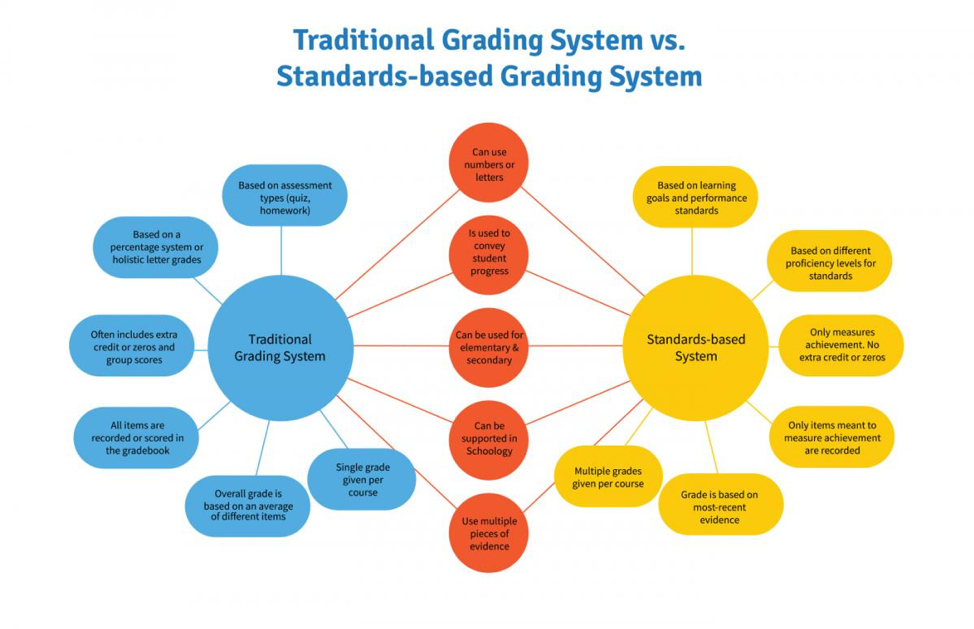Standards Based Reporting/ Frequently Asked Questions
Do you want to know more about standards based reporting at SCE? Please start by watching our video Standards Based Reporting SCE- Part 1. This video explains how Professional Learning Communities changed our culture and way of thinking. PLCs created a paradigm shift that initiated a sense of urgency to change our grading practices. Thank you for your patience and for sharing this journey with us. #WeAreSCE
Keisha Panagos – Standards Based Reporting SCE – Part 1
https://www.youtube.com/watch?v=bdbcrtQhfNQ
Where do the "standards" come from?
In 2010, Missouri adopted the new Common Core Standards (New Missouri Learning Standards) and shortly after, Scott City R-1 revised curriculum to align to these new standards. In 2014 Missouri adopted new science standards, the Next Generation Science Standards (NGSS).
Why is Scott City Elementary utilizing Standards Based Report Cards (SBRC)?
Standards Based Report Cards are able to provide parents, students, and teachers with more specific information than a traditional reporting system does. In the traditional system, grades from all types of measures assessing many different standards and elements are averaged together to obtain one score for a subject area. In a standards-based grading system, teachers are able to communicate to students and parents specific progress on individual elements of the standards. This information allows parents, teachers, and students themselves to target areas for improvement and establish goals for their learning. It is our way to be intentional in tracking student’s progress and achievements while focusing on helping students learn and reach their highest potential. It is based on students showing signs of mastery of understanding various lessons and skills.
How does this affect students?
We believe that all children can learn and succeed. Standards based reporting will make it easier for all students to know what success in school looks like and to focus on their learning needs. The better information we have about student learning, the more targeted our instruction can be. Students in special education will continue to receive quarterly updates on their progress toward IEP goals.
Rick Wormeli – How Much Should Homework Count?
https://www.youtube.com/watch?time_continue=3&v=nMJ-vEl4WB8&feature=emb_title
How does homework become affected?
Let's start with this great article about homework and its impact on learning.
What about late work and retakes?
Rick Wormeli-On Late Work
https://www.youtube.com/watch?time_continue=11&v=FHeij2Zfil4&feature=emb_title
Rick Wormeli- Redos, Retakes, and Do-Overs, Part One
https://www.youtube.com/watch?time_continue=5&v=TM-3PFfIfvI&feature=emb_title
Rick Wormeli- Redos, Retakes, and Do-Overs, Part Two
https://www.youtube.com/watch?v=wgxvzEc0rvs&feature=emb_title
What is a standards based report card?
The purpose of a report card is to clearly, fairly, and objectively communicate how a child is doing in school. A standards based report card communicates specifically how a child is performing and which areas need improvement or attention. All teachers in a grade level measure student learning against previously established criteria. This is different from a traditional report card which gives a single letter grade for subject categories. A standards based report card puts the emphasis on learning, rather than on comparisons among students. A standards based report card provides information the teacher and parents can use to assist your child. It separates academic performance from work habits and behaviors as well as personal characteristics.
Rick Wormeli: Gradebooks
https://www.youtube.com/watch?v=NC7ZI8zr_Mk&feature=emb_title
How does Standards Based Grading impact exceptional learners?
Grading Students with Special Needs
SBG: A Model for Special Education
Standards-Based Grading: Implications for Students with Special Needs
Standards based Grading System vs. Traditional Grading System
Standards based reporting is often contrasted with a more traditional approach to grading and assessment. Instead of the all-or-nothing, percentages-and-letter-grades approach, standards-based approaches considers evidence of learning and the data it produces in different ways. We are asking that the SCR-1 community join us in our journey as we make this pedagogical shift that is necessary to completely adopt a standards based approach.

Benefits of Standards Based Reporting
The instructional changes that standards based reporting brings, has a myriad of advantages to students. Students are intrinsically motivated and have ownership of their learning. Instruction is more relevant because the student knows exactly where they are, where they want to be, and how to get there. Teachers are providing meaningful feedback and allowing students to focus their efforts on that feedback to improve their understanding. Grades have deeper meaning because they receive direct feedback on a specific skill and then are allowed multiple opportunities to show mastery. Teachers and students are held accountable because there are clearly identified learning targets and proficiency skills are clarified at the beginning of the class. Using common assessments enable teachers to track how well students understand the learning targets and can adjust instruction as needed to ensure proficiency. Parents can expect a meaningful grade, one that clearly communicates what learning has taken place. Standards based grades support learning by focusing on the concepts and skills that have or have not been learned rather than accumulating or losing points, so parents are aware of what their child needs help with.
How will students be graded?
Students will receive a 4, 3, 2, 1. They will receive proficiency based feedback. Feedback is vital for growth and allows the learner specific information on what is needed to reach their goal. Feedback is specific. Feedback is user-friendly. Feedback is timely. Feedback is goal referenced. Feedback is ongoing. Our students use their teacher’s feedback as a tool to continue to learn and grow. Standards based reporting provides an opportunity for students to show mastery of their learning and allowing multiple attempts to show mastery. Standards based instruction and grading is guiding our students on the pathway to being life-long learners. “The objective of education is to prepare the young to educate themselves throughout their lives.” -Robert Hutchins
Questions that parents can ask their students:
In what standards are you proficient?
In what standards are you not proficient?
What standards do you plan to reassess?
